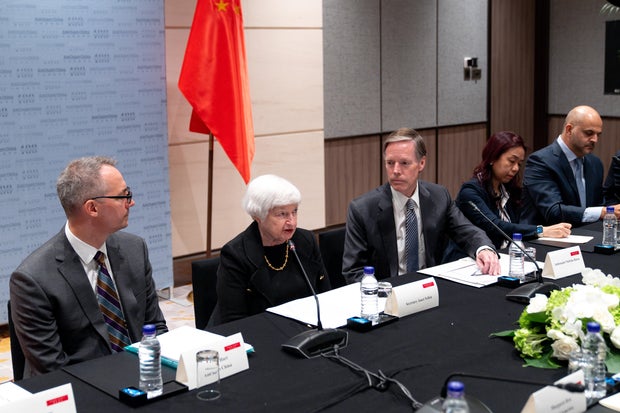Treasury Secretary Janet Yellen raised concerns over Chinese business practices during her visit to Beijing Friday, warning the economic relationship between the U.S. and China must work for American workers and businesses, and she said the U.S. would respond to unfair economic practices.
“I’ve been particularly troubled by punitive actions that have been taken against U.S. firms in recent months,” Yellen said at a roundtable that brought together representatives of some of the largest companies in the U.S. that have businesses in China, including Boeing, Bank of America and Cargill.
During her three-day visit, the treasury secretary is also sitting down with senior Chinese officials for high-stakes meetings amid escalating tensions between the world’s two largest economies.
Andrea Verdelli/ Bloomberg via Getty Images
During the roundtable, Yellen also criticized new export controls announced by China on two minerals crucial to semiconductor technologies, gallium and germanium, that were announced as trade disputes continue between the two countries.
Gallium is used in electronics, in chips for mobile and satellite communications and LED displays and sensors used in space and defense systems, among other applications, according to the Critical Raw Materials Alliance. Eighty percent of the world’s gallium is in China. Germanium, the alliance says, is used in fiber optics and infrared optics and has applications in electronics and solar cells. About 60% of the world’s germanium is produced by China
The U.S. has moved to block Chinese access to some technologies, and Yellen said the U.S. was still evaluating the impact of the export controls.
“I will always champion your interests and work to make sure there is a level playing field. This includes coordinating with our allies to respond to China’s unfair economic practices,” Yellen told the U.S. businesses.
Still, Yellen said at the roundtable, “I have made clear that the United States does not seek a wholesale separation of our economies. We seek to diversify, not to decouple.” She added, “A decoupling of the world’s two largest economies would be destabilizing for the global economy, and it would be virtually impossible to undertake.”
Yellen said she is discussing areas of concern with her Chinese counterparts including China’s use of expanded subsidies for state-owned enterprises and domestic firms and barriers to market access.
While in Beijing, Yellen also met with Premier Li Qiang at the Great Hall of the People to talk about the economic relationship between the U.S. and China.
“The United States will, in certain circumstances, need to pursue targeted actions to protect its national security, and we may disagree in these instances,” Yellen said during her meeting with Li. “However, we should not allow any disagreement to lead to misunderstandings that needlessly worsen our bilateral economic and financial relationship.”
Yellen told Li the U.S. seeks “healthy economic competition” with China that benefits both countries. A senior Treasury official described the meeting, which lasted twice as long as scheduled, as “very candid and constructive.” With the series of high ranking U.S. officials visiting Beijing, Li remarked people may have “high expectations.”
Yellen is the second top-ranking Biden administration official to head to China in recent weeks. Secretary of State Antony Blinken traveled to Beijing last month where he met directly with President Xi Jinping.
Yellen has a second day of meetings to attend in Beijing, including one with Vice Premier He Lifeng and a lunch with women economists. She is not expected to meet with Xi.
